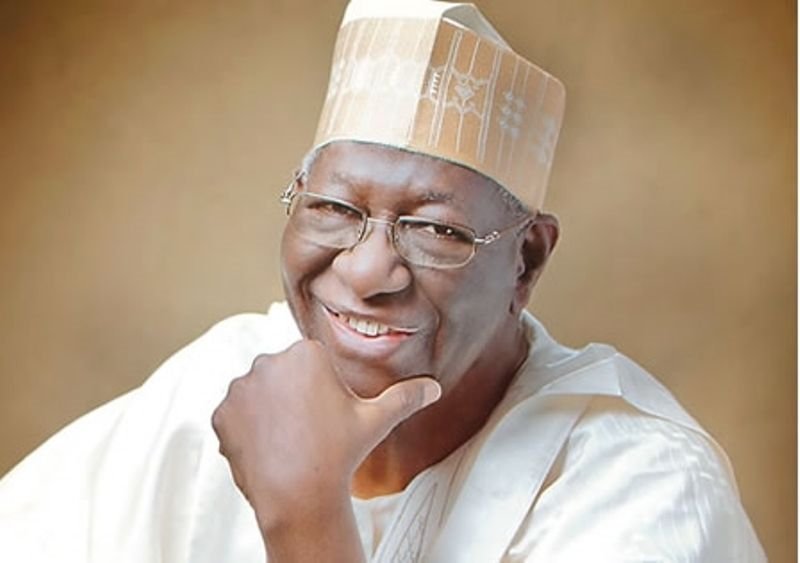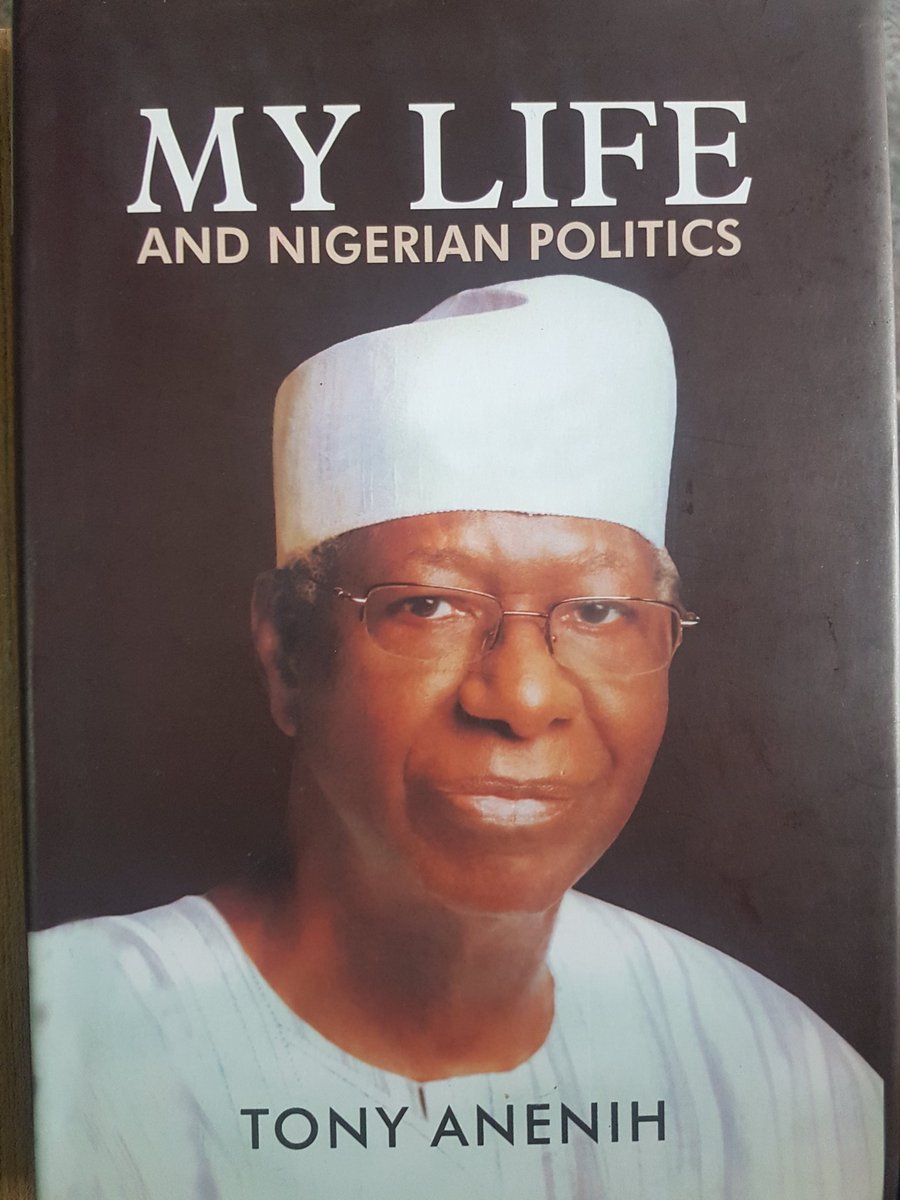
EARLY YEARS... HARD KNOCK LIFE
Tony Anenih was born on August 4, 1933 in Uzenema-Arue in Uromi in the defunct Bendel State (modern Edo and Delta) in the Mid-Western region of Nigeria — same town where Anthony Enahoro, journalist, foremost anti-colonial and pro-democracy activist, was born.
His parents were of humble background. They were so cash-strapped that they could not afford the young Tony’s school fees of E5 when the brilliant child was offered admission into St. Thomas’ Teachers’ Training College in Ibuza. For this reason Tony became a teacher manqué.
However, determined to succeed in life, little ‘Tony decided to pull himself up by his own bootstraps, leaving the bosom of his kith and kin to live with Lance Corporal Alfred Omeben (father of Rtd. Deputy Inspector Of Police, Christopher Omeben) to be under his tutelage for rubber trading. But as fate would have it, Alfred, his foster father, advised him to try his luck with The Nigeria Police; he did and was chosen.
He juggled his work as a police officer with schooling and finished his secondary school education. He proceeded to the Police College in Ikeja from Benin on July 1, 1951 and was lucky to be one of the select few sent for further training at Bramshill Police College, Basingstoke, England in 1966 and International Police College Academy, Washington DC in 1970. Having become a full-fledged police officer, he had his first feel of the corridors of power when he was attached to the first Governor General of Nigeria, Dr. Nnamdi Azikwe, as a police orderly. He worked in various capacities as a police officer before he voluntarily retired on January 14, 1976 as a police commissioner.
After quitting the Nigeria Police, Anenih had a successful stint as a businessman investing heavily in drugs, electronics, frozen meat, oil palm plantations and import and sale of cars. The hubs of his business operations cut across the length and breadth of the country.
POLITICAL STRATEGIST, FINANCIER, KINGMAKER, ALL-ROUND FIXER
His political career spanned over three decades of the Nigerian political history. His was a political career that traversed the National Party of Nigeria (NPN) in the Second Republic, Social Democratic Party (SDP) of the aborted Third Republic and the Peoples Democratic Party of the Fourth Republic. However, he joined partisan politics in 1981 or thereabouts at the behest of the then President Shehu Shagari. He was made NPN Chairman in the defunct Bendel State and through the deployment of his political acumen and strategy he caused a big upset on the political scene of Bendel State when his party's candidate, Samuel Ogbemudia, defeated the incumbent Governor, Ambrose Alli, of the Unity Party Of Nigeria (UPN). Unfortunately for him, Ogbemudia had hardly settled down in office when General Muhammad Buhari toppled the civilian administration and put paid to the Scond Republic. He would later resurface in the political firmament of Nigeria when Babaginda lifted the ban on political participation and came up with two political parties: Social Democratic Party (SDP) and National Republican Convention (NRC).
His political career spanned over three decades of the Nigerian political history. His was a political career that traversed the National Party of Nigeria (NPN) in the Second Republic, Social Democratic Party (SDP) of the aborted Third Republic and the Peoples Democratic Party of the Fourth Republic. However, he joined partisan politics in 1981 or thereabouts at the behest of the then President Shehu Shagari. He was made NPN Chairman in the defunct Bendel State and through the deployment of his political acumen and strategy he caused a big upset on the political scene of Bendel State when his party's candidate, Samuel Ogbemudia, defeated the incumbent Governor, Ambrose Alli, of the Unity Party Of Nigeria (UPN). Unfortunately for him, Ogbemudia had hardly settled down in office when General Muhammad Buhari toppled the civilian administration and put paid to the Scond Republic. He would later resurface in the political firmament of Nigeria when Babaginda lifted the ban on political participation and came up with two political parties: Social Democratic Party (SDP) and National Republican Convention (NRC).
Anenih the fixer served as a National Chairman of SDP. He is often said to have talked the Late M.K.O Abiola, winner of the SDP presidential ticket, into using Babagana Kingibe who came second in the presidential primary as his running despite sharing the same religious persuasion. In fact, he presided over the meeting where Kingibe was chosen as Abiola’s running mate. At the state level, he used his political clout to make John Odigie-Oyegun (former APC National Chairman) as Governor of the nascent Edo State over the influential Lucky Igbinedion, who was the standard-bearer of the NRC.
When the Fourth Republic kicked off in 1999, he became one of the power brokers of the PDP. He was formerly of the Peoples Democratic Movement (PDM), which formed an alliance with PDP in the build-up to the 1999 election. It is believed he was instrumental to the emergence of Obasanjo as PDP presidential candidate, and he donated Atiku Abubakar, his former PDM member, as his running mate. This was against the run of play because Anenih used his strategy and brinkmanship to wrest the reins of power from Alex Ekweme, who was the purported leader of the PDP before they formed alliance with PDM. In his state, he supported the candidature of Lucky Igbinedion, whom he had made to bite the dust in the aborted Third Republic and Igbinedion won the governorship election. Anenih would later serve as Minister of Works and Housing under Obasanjo and as Chairman Board of Trustees of the PDP in the twilight of the Obasanjo administration.
'THAT N300BILLION ALLEGATION' AND OTHER STORIES
Though the late Anenih spent a substantial chunk of his years in the cozy corridors of power, his life was not a vast and beguiling bed of roses; he had his ups and downs. In 1983 when Buhari truncated the Second Republic, he was one of the politicians clamped in detention for the almost two years.
Also, in December 2009, the Senate debated a damning report detailing how he and some other ministers during the Obasanjo administration allegedly mismanaged billions of naira meant for the rehabilitation and construction of roads. The money mismanaged was close to N300billion in a period of 10 years (1999-2009). In fact, it is believed in some quarters that he acquired his 'Mr Fix it' sobriquet via this damnable act and not for his ability to fix politicians in positions of power.
He was unfavourably disposed to this sobriquet as well. In his autobiography 'My Life and Nigerian Politics', he said: “I am aware that some people call me ‘Mr Fix it’. I think such people call me that name, either in contempt or in admiration. It is possible that they are being mischievous. A few questions arise here. Am I 'Mr fix It' as a reformer or someone who always does things right? Am I being portrayed as one who gets things settled or fixed? Am I being held out as someone who, by hook or crook, achieves results with the belief that the end justifies the means? In any case, I do not enjoy this appellation. I have always believed in what I do and I always make sure I achieve successes, without listening to the crowd of voices. If I am called an achiever, that sounds more complimentary, satisfying and positive than the ambiguous impression, which ‘Mr Fix it’ connotes.”
Just recently, again, he was embroiled in the scandalous and outrageous Dasukigate. It was reported that he collected humongous amount from the money meant for the procurement of arms. In fact Olu Falae, former Secretary to the Federal Government during the Ibrahim Babangida regime, confessed to collecting N100million from Anenih.
On a personal note, his family was rattled — and ravaged — in quick succession by the gale of grief when he lost his wife and son within a spate of one month. His wife, Patricia Anenih, who was the first national woman leader of PDP (1999 to 2005) died on Easter Sunday April16, 2017 and his son Eugene Anenih slumped and died barely a month after, on May, 15 2017, while playing lawn tennis.
Tony Anenih bestrode the Nigerian political space like a colossus in his lifetime. He was one of the prominent protagonists in the political drama of this country. For this reason, he will be sorely missed.
Chief Tony Anenih died yesterday at the age of 85.
May his soul rest in peace.

Chief Tony Anenih died yesterday at the age of 85.
May his soul rest in peace.

No comments:
Post a Comment